Dr. Sam Gomberg, former principal and architect of Just Community, has died at age 74
Using techniques of Lawrence Kohlberg, he showed a generation of Shalhevet faculty how to teach ethical reasoning through moral dilemmas
BP Photo by Sam Elyaszadeh from 2007 Shalhevet yearbook
Caption: FOUNDER: Dr. Sam Gomberg, z”l, taught teachers how to develop ethical thinking to students.
March 10, 2021
Dr. Sam Gomberg, former Shalhevet principal and Director of Moral Education and an integral contributor to the school’s Just Community, passed away at age 74 March 2 at his home in Crest Hill, Ill., a suburb of Chicago.
The cause was a heart condition, according to Shalhevet founder Dr. Jerry Friedman.
In the 1990s, Dr. Gomberg taught alongside Dr. Friedman at Harvard during the summertime. Dr. Friedman taught courses to educators from Jewish schools, and as part of his staff, Dr. Gomberg focused on teaching how to use moral dilemmas within a school environment.
“We became really friendly — I really respected him,” Dr. Friedman said in an interview with the Boiling Point last week.
The two also were both followers of Professor Lawrence Kohlberg, who showed that teachers could use a combination of dilemma exercises and student empowerment to advance them through stages of moral reasoning.
Dr. Friedman sought him out to join Shalhevet.
“I needed somebody to train the staff on moral dilemmas, hypotheticals, real-life moral dilemmas,” Dr. Friedman said. “If the staff didn’t understand what it was all about, then why should they be motivated to share the democracy with the kids?”
However, Dr. Gomberg didn’t immediately accept.
“It took a couple of years until I finally got him, because he was head of the history department at a large high school,” said Dr. Friedman. “Part of it, I just kept pushing and pushing. And the other part is that he really believed so strongly to advocate this type of methodology for a Just Community.”
Dr. Gomberg was principal from 2000 until 2007. Every fall, he gave all new teachers a week of Kohlberg and Just Community training before they started their first-semester.
He also worked with student leaders to draft the original Just Community Constitution, including Town Hall, the Agenda Committee, the Fairness Committee, the proposal and amendment process, and the rights of all community members to fairness, to respect, and to be heard.
After leaving Shalhevet, Dr. Gomberg returned to Illinois, and continued to teach teachers through workshops and conventions. According to an obituary notice in the Chicago Tribune, he is survived by his wife, Linda, and daughters, Annie, Dara and Amanda, and several grandchildren.
Dr. Friedman said Dr. Gomberg accepted his offer to come to Los Angeles because he wanted to help create a school that wasn’t authoritarian.
“There are so many things that, within a school, the students know as much and feel as much as some of the staff, and they can really contribute and feel they really are part of the school,” Dr. Friedman said.
“He really loved what he was doing. He was a mensch, and he was a very good friend and a colleague.”
After growing up in St. Louis, Dr. Gomberg earned his Bachelor’s degree from the University of Wisconsin and his doctorate from Carnegie-Mellon University in Pittsburgh. He wrote his dissertation on how to teach teachers to run discussions on moral dilemmas. Among the teachers he influenced at Shalhevet was Dr. Jill Beerman, who taught history from 1994 to 2011 and became a close friend.
“Dr. Gomberg was not religious, but tikkun olam [repairing the world] was something he believed in very strongly,” said Dr. Beerman told the Boiling Point. “He felt that no matter your station in life, you are obligated to do good and to help others because it’s the right thing to do…
“He was always saying ‘You have to make a difference you know — no matter what you do, you have to make a difference.’”
On a more personal level, Dr. Gomberg helped Dr. Beerman change her dissertation topic and thereby finish her doctorate at NYU.
“I’d given up writing my dissertation, and he said ‘Well why don’t you do a different one?’ and I ended up doing one on using movies — moral dilemmas in films — to teach history,” Dr. Beerman said. “He read every chapter, he offered suggestions. He was very, very helpful in that.”
Dr. Beerman said moral education is necessary even in a religious school, because while it is easy to know what the right thing to do is, it is more difficult to actually execute the action, especially when nobody is watching.
“Religion doesn’t guarantee moral and ethical behavior,” said Dr. Beerman. “The whole thing with moral dilemmas, and the Just Community particularly, is to move people not just to where they can see a problem where perhaps others don’t, but that eventually they will get to a point where they will take some action…
“When you hear somebody say something that doesn’t agree with what you thought, but then you’re thinking ‘Well gee, wait a minute, that kind of makes sense’ — that’s cognitive dissonance, and that helps you to grow in your mind,” said Dr. Beerman. “You’re always bumping up against somebody else’s opinion and that forces you to think, and sometimes rethink your own.”
When she surveyed her history classes, Dr. Beerman said, roughly two-thirds of her students thought using moral dilemmas helped them remember the subject matter better too.
“Students enjoy them and they remember them,” she said. “In my own field, I think it brings history to life.”
Dr. Beerman said that Dr. Gomberg once led a moral dilemma discussion with a class of sixth-graders about a girl who promised her father that she would not climb trees anymore, but her friend’s cat was now stuck in one and too afraid to come down. Should she climb the tree to get the cat?
“He said it was one of the best moral dilemma discussions he’s ever had,” said Dr. Beerman.
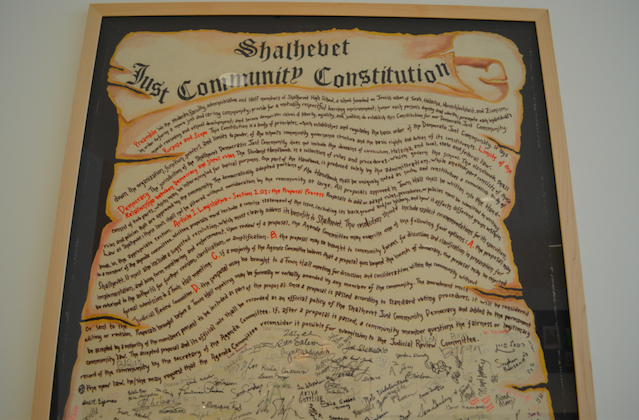
One of Dr. Gomberg’s greatest contributions to Shalhevet was helping to draft the original constitution of the Just Community. He worked closely on it with students, and in 2002, its preamble was written out on a giant parchment-like poster that was signed by that year’s students and then framed.
That is the Constitution that normally hangs at school at the top of the stairs in the second-floor lobby, although it has been moved this year to display at admissions events.
In a note to the Shalhevet class of 2007 published in their yearbook, Dr. Gomberg summarized what he hoped they had learned from the school. He said the graduates should have developed character, ethics, and higher stages of ethical reasoning on the six-step Kohlberg scale.
“We believe in two overarching goals: to aid students in becoming smart and to help them become good, each one a mensch…,” Dr. Gomberg wrote.
“While they participate in moral dilemma discussions or vigorous Town Hall debates, Shalhevet students experience a unique school — a school unlike any school in the country. That is indeed what Shalhevet is all about.”
According to Dr. Beerman, besides the courses that he taught with Dr. Friedman at Harvard, Dr. Gomberg spread his passion for teaching and exploring moral dilemmas, along with working humor into lessons, to attendees at conventions and workshops including at the National Council of Social Studies.
Mrs. Joelle Keene, music and journalism teacher, said that Dr. Gomberg always pushed teachers to find their own answers to their questions.
“As principal, he gave us the confidence to answer our own questions by affirming the validity of the questions and kind of congratulating us for asking them,” said Mrs. Keene.
According to Mrs. Keene, Dr. Gomberg really liked questions and believed that all questions were good questions.
“I think for Dr. Gomberg, the way you learn, and the way you grew, was to focus on the question and try to answer it yourself, and I still do a lot of that,” she said. “Most of the time when I’m stuck on something about teaching, I hear Dr. Gomberg’s voice, and I just go down into the question and try to figure it out. And it really isn’t that different from moral dilemmas.”
She said that Dr. Gomberg helped her to become a more confident teacher, without telling her exactly what to do.
“He gave me the knowledge that getting stuck and having a good question was a good thing and a good sign, and that I should go with it and see where it would take me,” Mrs. Keene said. “When I have questions today, sometimes I picture him kinda leaning back and smiling, going, ‘Hmm, yeah, that’s a really good question!’”
Dr. Beerman said that Dr. Gomberg’s cardiologist and one of his nurses during his last years were actually former students, both of whom gave him their personal phone numbers and insisted that he call whenever he needed anything.
“This is 35, 40 years after he taught them,” said Dr. Beerman. “They still remember him, and remember him fondly, and wanted to take care of him the best they could.”
She described Dr. Gomberg as an extremely generous man and mentor with a great sense of humor and love for Seinfeld and the St. Louis Cardinals.
The best way to honor Dr. Gomberg, Dr. Beerman said, would be to continue teaching and learning moral dilemmas at Shalhevet.
“That’s what he dedicated his entire professional life to doing,” she said. “He would even get letters and emails from people that he’d taught, or who used materials that he made available online, who told him it was the best thing that they’d ever done in the classroom.”

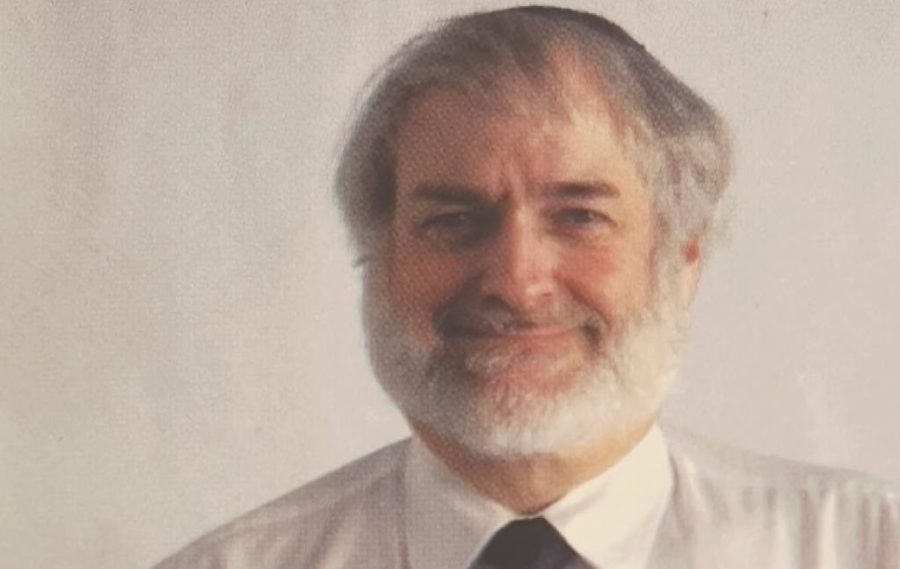
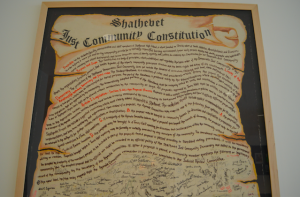
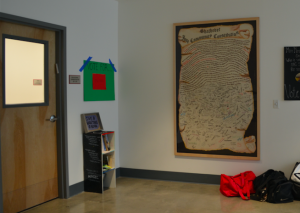
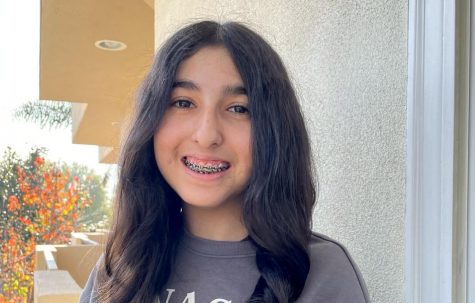












Nellie Javaherian, Los Angeles • Mar 10, 2021 at 4:22 pm
This is awesome Talia! I love the way you wrote this, and it’s so informing! Keep up the great work, I can’t wait to see your next article!